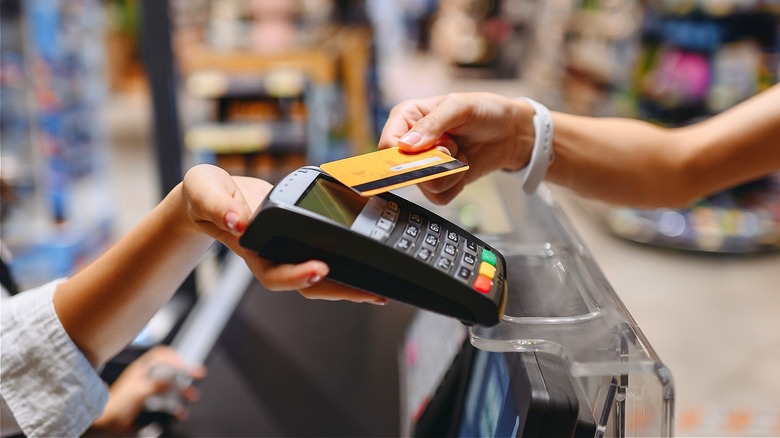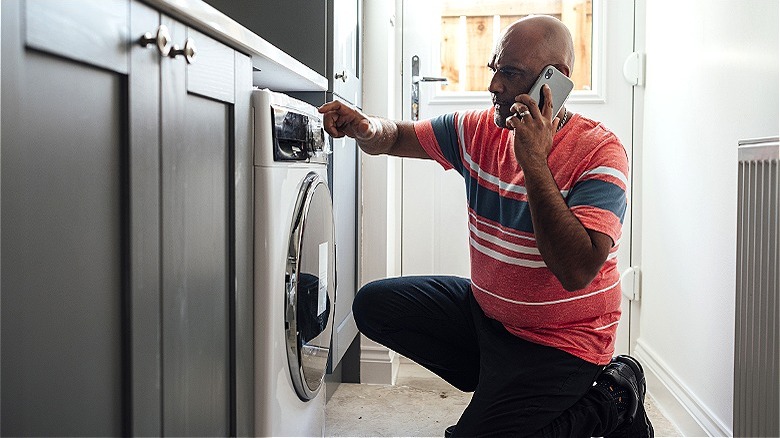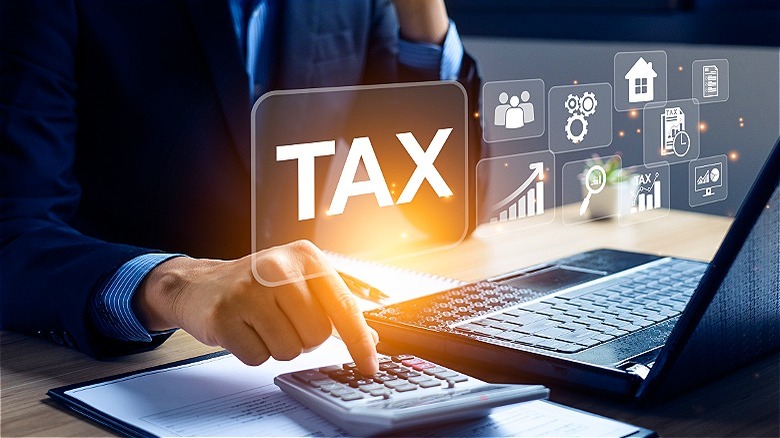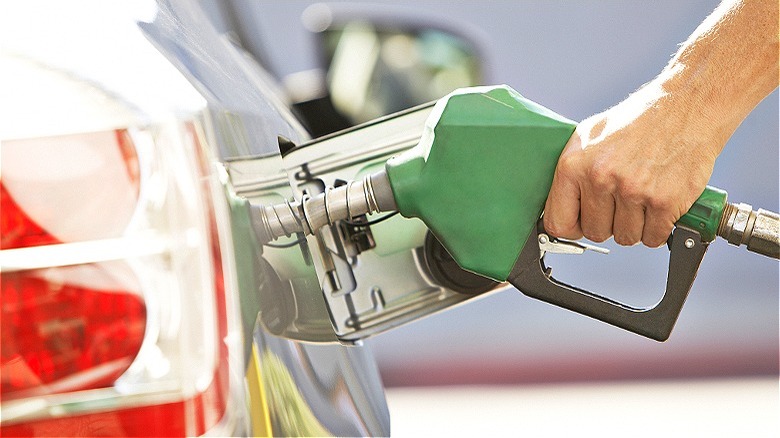Things You Should Always Pay For With A Credit Card
Credit cards are a valuable tool that modern-day consumers have adopted with a unique fervor. In 2021, for example, according to a study by the Federal Reserve Bank of San Francisco, consumers used credit cards to make payments 28% of the time, while a separate study conducted by Experian found that the average total credit limit for consumers in 2022 was $28,930. Coupled with the fact that merchants are still opting to go cashless in many business settings, cash and debit transactions have seen a massive reduction in utilization and indeed value to consumers.
With this said, there are plenty of things that make credit cards a problematic financial tool. From increasing debt loads in the consumer finance space to a rising cost of living and rapidly ballooning prices for things like medical treatment, higher education, and even groceries, many consumers are looking to cut lending products out of their lives in any way they can. But there are many reasons to get excited about using your credit card; that is, under the right conditions, of course. In fact, there are several spending situations in which using a credit card proves such an advantageous strategy, you should rarely pull out any other form of payment. From renting cars to paying for that Amazon Prime subscription, there are numerous circumstances where using a credit card offers immense value.
Concert tickets
One of the most visible perks you'll find with your credit card comes in the form of concert tickets and entry to other events. Festivals and various other live events of all types are often sponsored by credit card companies or are held in partnership with one. This means cardholders often get first crack at the tickets when they're made available.
Presale tickets can be hard to come by under normal circumstances, especially when it comes to bigger-name acts. I can personally attest to the utility of a branded credit card in this regard. Bruce Springsteen's 2023 United Kingdom dates were put on in partnership with American Express, and while Ticketmaster horror stories, which saw prices reach into the thousands to see the Boss, were making the rounds, I logged into my American Express account and purchased two £90 tickets without any time-crunch or stress.
These kinds of partnerships take place all the time, so keeping one or more of the big-name credit cards in your arsenal can help maximize your ability to get easy presale access and potentially even discounted rates on upgraded ticket packages.
Flights and hotels
Travelers will see a major benefit when using credit cards rather than a standard debit card. For one thing, basic insurance coverage is often built into a credit card's underlying perks. This means you may have integrated travel insurance baked into any transit tickets you purchase with the card. More importantly, with a veritable oasis of travel rewards cards populating the marketplace. accumulating points toward free travel or nights in a hotel can be supercharged when used to purchase other travel essentials. Many airline credit cards, for instance, provide one point per dollar on most purchases with multipliers racking up additional points spent directly with the airline and/or on other travel categories.
The same can be said for hotel rewards cards. Booking a hotel room with your rewards credit card might give you access to a discounted rate, free upgrades, and other perks that can elevate your stay without any additional expense or effort. As well, branded airline cards often include little-known perks like lounge passes, free checked bags, and other upgrade features that come included with a ticket purchase made with the card.
Streaming services
For those who don't want to routinely spend with a credit card, this financial tool can still provide some key benefits. Many high-net-worth individuals do shy away from an overreliance on lending products, which helps them maintain a highly positive debt-to-asset ratio. However, there are plenty of features in modern life that require a credit score and history. Opening up a new utility account or an internet or cell phone plan, for example, requires basic credit vetting that establishes who you are and some other basic facts about you as a consumer. This means that keeping at least one credit card or some other lending products, like a mortgage loan or car loan in good standing, is important for anyone seeking to participate in the modern society we all inhabit.
One of the various streaming services available today offers itself up as an excellent candidate for maintaining an active credit history. Even if you're someone who never pulls out a credit card from your wallet, signing up for one or more streaming services with your credit card and then setting up autopay to immediately deduct this expense from your bank account each month will automate the payment while routing it through your credit account. Functionally, this setup will operate as if you weren't using a credit card at all. However, you'll gain the benefit of consistent monthly usage and repayment. Moreover, if your card offers a rewards program, you'll also get to enjoy the trickle of points or cash back that comes with spending.
Appliances and other electronics
Many credit cards offer extended warranty coverage built into their perks. This means that buying a new appliance or a large electronic good, like a television or computer, with your card adds extended coverage beyond a manufacturer's warranty or any coverage that might be offered by the store itself. Also, if you're buying with your regular cash-back credit card, these types of expenses are typically fairly large and provide a greater rewards-earning potential in comparison to everyday spending.
Another option is the use of a store credit card. This kind of financing arrangement often exists as sort of a red flag that borrowers might want to tread carefully while using or avoid altogether. This said, if you're extremely careful and make sure to read the fine print, you can successfully use a store credit account to enjoy low or even zero-interest financing on your purchase. You might even get to walk away with no money down on the purchase. Store credit cards often accumulate interest that's then added back to the balance if you don't pay off the expense in full during the promotional term though, so treading very carefully is crucial here.
Rental cars
Once again, your credit card may offer standard insurance coverage that can be used on rental cars. This means you'll be able to confidently and successfully rebuff the upsell that the check-in agent is almost certain to offer. This insurance coverage will give you peace of mind while you're on the road during a vacation or business trip, or even just to cruise around town while your car is in the shop.
There's another major advantage found when using a credit card in this regard, however. To finalize your rental agreement, the agent you work with is almost certainly going to take a deposit from you. With a credit card, this is a small hold placed on the account. It acts as a pre-approved block that can then be changed later if necessary (or reversed entirely if you return the vehicle after an uneventful rental). However, if you rent a vehicle using a debit card, you may be charged a much higher figure, sacrificing cash in your bank account for the duration of your rental. This is because rental agencies don't have the same leeway to amend a charge on a debit account that you can simply remove funds from. The result is that rental companies are more amenable to clients using credit cards. Moreover, the high deposit amount may make renting a car totally off-limits to those without a credit account for lack of additional funds.
Anything you plan to deduct on your tax return
If you plan to itemize your taxes, a credit card can prove beneficial. Not only will you get to take advantage of potential cash-back or rewards-point-earning opportunities, but your card statements will act as a convenient organizational tool when it comes time to do your calculations. Using the same payment method for everything you'll be itemizing means not having to dig around for various statements or track down receipts in order to add up your expenditures come tax time. Credit cards offer a convenient approach when itemizing deductions, but even if you would prefer to shy away from credit accounts, you'll still want to avoid pure cash transactions whenever possible.
A credit card account not only brings in additional consumer protections, but it means you won't potentially lose out on itemized additions because you can't find a payment confirmation. With this said, you should still hold on to your receipts and store them with your other tax documents for at least three years — the recommended time to hold on to tax returns/documents for most taxpayers.
Online purchases
Using a card of some type is a requirement when paying online for things. But as the Federal Trade Commission warns, consumers should avoid supplying debit card details when engaging in digital spending. Using a credit card when you make purchases online gives you a bit more protection than you would find with a debit card. For one, credit card companies are often easier to work with when disputing fraudulent activity or trying to successfully navigate a refund from a difficult merchant.
However, customer service isn't the only reason to rely on a credit account. As noted by the FTC, fraudulent activity is a constant threat these days. The digital marketplace is a great way to find all kinds of goods, but it comes with an added element of risk in terms of identity theft and the potential for leaked payment account information. If your credit card details are robbed, working with your card issuer to reverse charges and get a new card number is a fairly straightforward endeavor. But, if your debit card information gets out, the money spent is actual cash from your bank account. The situation is drastically different and far more severe.
Gasoline
Cash-back cards often provide returns that fall into different spending categories. Your particular card, for example, might offer increased payouts for grocery shopping, money spent at restaurants, and other routine purchases. One category that tends to see quite a bit of expanded earning potential is purchases made at gas stations. If you have a car, you know it requires regular refueling, though frequency will vary as everyone's driving habits are different. You might need to stop for gas once every week or once a month, but there's an inevitability to this ritual nonetheless.
In addition to providing added protection should you fall victim to a card skimmer or some other financial data-theft scheme at the gas station, credit cards also, as said, offer associated bonuses for spending at the pump, making this a high-leverage category. Gas is something that people have to buy on a regular basis, so you might as well utilize a purchasing tool that's safer on the whole and provides a slight bonus for its use over more vulnerable and less rewarding alternatives.
Business travel and other work-related expenses
If you're someone who frequently travels for work — or perhaps someone who gets reimbursed for infrequent business travel — you might be intimately familiar with filing expense reports and getting reimbursed for your outlays. Whether it's a check to cover miles driven or a comprehensive expense book reimbursement that covers flights, hotels, and even meals with clients, anytime you're spending on someone else's dime like this you should look for added (legitimate) benefits you can build into the transaction. If you're frequently flying for business, for example, using a branded airline card can make these expenses even more worthwhile. You might also consider using one card specifically for your business-related expenses so that you can simply peruse your monthly statement to complete a reimbursement submission rather than having to sift through a more complicated bill that includes personal spending, too.
As is always the case when it comes to credit cards, the more complicated your circumstances are, the more vigilant you'll need to be when maintaining your spending accounts. Adding the wrinkle of reimbursement into the mix means you may need to pay off expenses on your own and then look to "refund yourself" when the expense check is delivered. If you don't reliably get your checks before the billing cycle closes, managing this account responsibly can help you stave off any additional interest that may be levied.
Home improvement costs
Whether you're hiring a contractor or performing home improvement tasks yourself, it's always a good idea to try to pay with a credit card when possible. With this payment method, you're gifted an additional layer of protection that helps defend you if something goes wrong. Note, when it comes to working with professional tradespeople, you could be looking at a slightly higher cost when paying with a card, but the additional expense could prove well worth it. Not only does a card payment eliminate any sort of potential dispute over how much has been handed over — and at what stage of the project — but in the event of a dispute you'll have a potent form of assistance in your corner.
As always, stopping a payment or disputing a transaction made on a credit card is a far more fluid process than other forms of payment. Similarly, using your line of credit can help to deliver rewards bonuses and a boost to your cash flow. This said, it's always important to manage your balance and repayment obligations responsibly, especially when it comes to potentially expensive payments for major renovation services.
When dining out at restaurants
Eating dinner out with friends or family, or even grabbing a quick bite on your own, has become a routine part of modern living. While too much restaurant food is among the ways you can unwisely waste money, the occasional meal that you don't have to prepare yourself can save time and offers itself as a great social space for sharing important moments with loved ones. Further, anytime you go out to eat, you should use your credit card to pay the bill rather than with a debit card or even cash.
The reality of the modern financial marketplace has a unique and slightly dark undertone. Because credit cards have become so ubiquitous in daily life, merchants across the board have raised prices ever so slightly to keep up with the service fees that card issuers skim off the top. As a result, paying with cash or any method other than credit cards has become increasingly expensive with little benefit to show for it. Obtaining rewards points or cash-back bonuses at these kinds of merchants helps give you that little extra boost. Moreover, many rewards cards offer extra multipliers for money spent at restaurants.
Purchases made when traveling overseas
It might seem like a good idea to withdraw cash from your bank in a foreign currency to take with you as you gear up to head overseas. Bringing some cash with you will ensure you aren't ever left in a lurch. You might want cash for a quick bite to eat while walking around the city or as a means to pay for public transportation or taxis.
But for most spending you do while abroad, your credit card will serve you better than cash. It's worth noting you shouldn't carry a wallet full of cards and identification documents in case you lose it or it's stolen, but one card you plan to use for most purchases, and specifically one you know will work overseas and doesn't carry a foreign transaction fee, will act as your financial passport to this distant landscape. The protections already mentioned extend to purchases made while overseas, and if your card is lost or lifted, canceling it and voiding any fraudulent transactions only requires a few quick steps in your credit card app or through a call. Rather than carrying lots of cash around with you and creating a financial vulnerability, a credit card should be your go-to method of payment while traveling.
Your cell phone bill
Finally, your cell phone bill is yet one more thing you should charge to a credit card account rather than use some other form of payment. If you pay your phone bill with your credit card then you may benefit from an integrated level of insurance protection for the device simply by the nature of your routine expense.
There may be some restrictions to this coverage (e.g., be aware of the deductible), but organizing your bill so it comes out of a credit card account rather than as a direct debit or some other payment method could help you in a pinch. This said, this type of coverage might not be available if you've missed a payment or in the event of damage from a natural disaster. Still, cell phone protection via a credit card is likely a little-known perk you didn't know was available. But, as said, for this type of insurance, just be aware you'll need to pay a deductible and claims are generally limited to twice a year.













